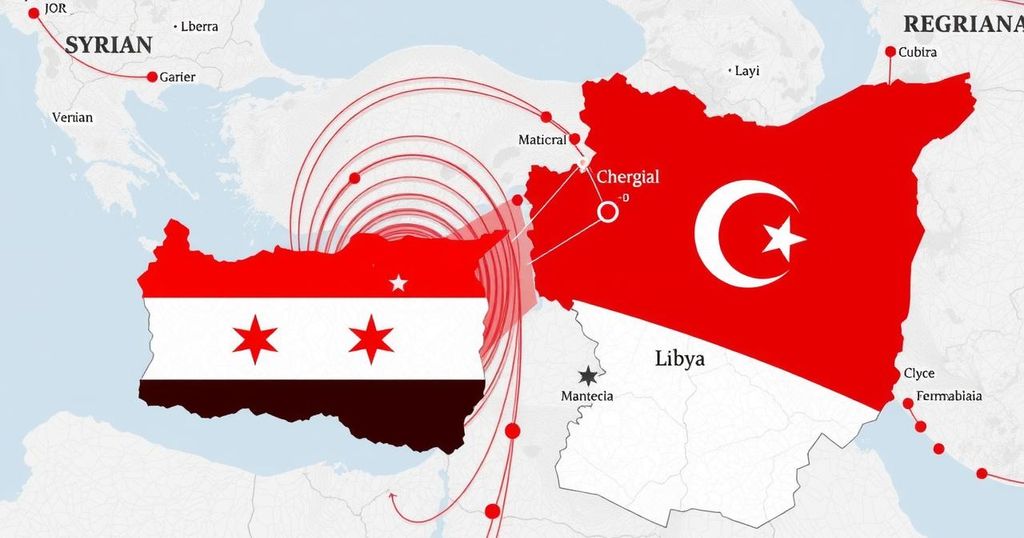World news
AFRICA, AL - ASSAD, ASIA, ASS, ASSAD, BASHA, BASHAR AL - ASSAD, BURKINA FASO, CENTRAL AFRICAN REPUBLIC, CHINA, EUROPE/ASIA, FOR THE STUDY OF WAR, GEOPOLITICS, INSTITUTE FOR THE STUDY OF WAR, INTERNATIONAL RELATIONS, IRAN, ISS TODAY, KHMEIMIM, KR, KREMLIN, LATAKIA, LIBYA, MALI, MEDITERRANEAN, MIDDLE EAST, MILITARY, MOSCOW, NIGER, NORTH ATLANTIC TREATY ORGANIZATION, QAMISHLI, RED SEAS, RUSSIA, SANCTIONS, SUDAN, SYRIA, TARTUS, WAR
Fatima Khan
0 Comments
Implications of Assad’s Fall: A Deteriorating Landscape for Libya and Russia’s Interests
The fall of Syria’s Assad regime presents significant challenges for Libya as Russia shifts military resources to maintain its presence in North Africa. This shift threatens to aggravate the ongoing conflict in Libya by entrenching foreign military elements in the region, complicating efforts for peace and stability. The situation underscores Russia’s need to adapt following strategic losses in Syria, further entrenching its role in Libyan affairs.
The recent downfall of Bashar al-Assad’s regime in Syria has significant implications for Libya, particularly regarding Russia’s military strategy in the region. Following Assad’s unexpected defeat, Russia’s military presence in the eastern Mediterranean is threatened, prompting Moscow to reevaluate its operations, particularly in Libya. Reports indicate that Russia is transferring military resources from Syria to Libya as it seeks to establish a more robust foothold in North Africa, thereby exacerbating the already tumultuous conflict in Libya.
Russia had relied on its bases in Syria to facilitate operations across several African nations, including Libya. The loss of these strategic anchors necessitates a shift in focus to other locations, with Libya emerging as a critical alternative. How the power dynamics evolve in Syria will unavoidably affect Russia’s military engagements elsewhere, especially as uncertainties surrounding the new Syrian government loom.
In Libya, Russia has historically supported General Khalifa Haftar in his clash with the Tripoli government, led by Prime Minister Abdul Hamid Dabaiba. Dabaiba has voiced his discontent over Russia’s military reinforcement, declaring that it transforms Libya into a battleground for foreign power conflicts, complicating the internal crisis further. Moreover, ongoing peace agreements stipulate the withdrawal of foreign military forces, yet Russia’s legal and political maneuvers defy these accords.
The larger consequences of Assad’s regime collapse extend to Africa as a whole, potentially constraining Russia’s capacity to support allied governments amid its overstretched military resources. The volatility of the situation underscores serious concerns regarding Russia’s ability to project power sustainably in the Sahel region, especially in countries like Mali, Niger, and Burkina Faso. The strategic pivot towards Libya may provide temporary relief for Moscow but at the cost of deepening the Libyan conflict, as its involvement further complicates aspirations for a peaceful resolution.
The article elaborates on the geopolitical ramifications of the fall of the Assad regime in Syria and its impact on Libya’s ongoing conflict. It highlights Russia’s strategic interests in the Middle East and Africa, revealing how the loss of Assad’s government threatens Moscow’s military operations in both regions. With Assad’s regime as a crucial ally for Russia, which has fortified its presence in Syria since 2015, the transition to a different leadership challenges Russia’s established military logistics and strategic planning across Africa, particularly in Libya.
In conclusion, the collapse of Bashar al-Assad’s regime in Syria presents a detrimental shift for Libya, reinforcing a certain level of instability as Russia reallocates its military resources to compensate for its losses in Syria. The implications of this action stand to intensify the already complex conflicts within Libya, thus undermining any prospects for peace. As such, the evolving dynamics highlight the precarious balance of power and the intricate nature of international military engagements in the region.
Original Source: issafrica.org




Post Comment